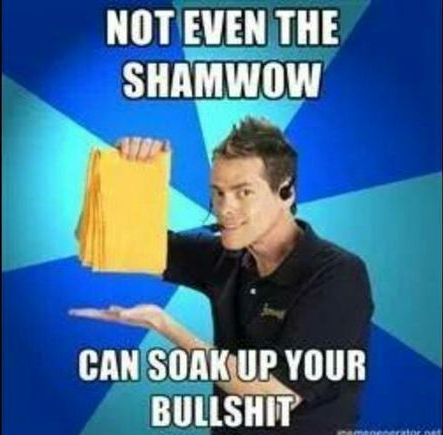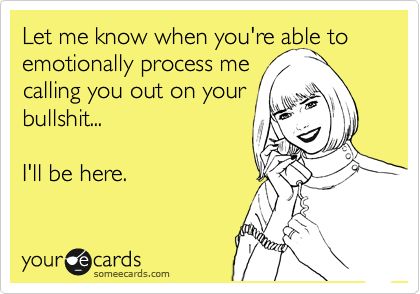 I was listening to NPR the other day and heard a definition of the word “bullshit.” I’d never thought of it as more than a careless epithet meaning something was definitively untrue, but it turns out the word has real application in its own right beyond a synonym for “lie.” The gist was this:
I was listening to NPR the other day and heard a definition of the word “bullshit.” I’d never thought of it as more than a careless epithet meaning something was definitively untrue, but it turns out the word has real application in its own right beyond a synonym for “lie.” The gist was this:
Bullshit is speaking with intentional disregard for the truth, usually in order to convince someone of something you wish them to believe. It’s not necessarily a lie; the bullshitter just isn’t interested in whether it’s true or not, as long as the rhetoric serves their interest.
Bullshit is all around us. It comes in the form of commercials, internet ads, billboards, salespeople and even friends. It is people who speak to us as if what they say is undeniable fact. They may quote “scientific” studies or use anecdotes as evidence their thing works, whether their thing is a car, a skin care product, a retirement plan or a parenting approach.
Some of these people are intentionally bullshitting us. They know they are pulling purported facts out of their ass (goes nicely with “bullshit,” doesn’t it?) but they do it to make commission. Other people, the ones harder to spot, do it subconsciously. They are bullshitting themselves and want us on the bandwagon too.
The most pervasive piece of bullshit of this latter group, of which we have all probably been a part from time to time, is that this product/procedure/service is something EVERYBODY needs. There are a few things all living people need: air, food, water, shelter from harsh elements… That’s about it. Notice what’s not on that list? Just about everything else: a financial adviser, yoga, a college education, essential oils, a full-time job…
Bullshit does not belong to just one industry. It is pervasive, from the salesperson at your door trying to sell you a vacuum to the gym membership rep who seems genuinely disappointed in your unwillingness to sign a three-year “commitment to a healthier you.” This is partly how our lives get so disorganized. We get talked into an MLM where we have to order things every month, a gym or spa membership we never end up using, a BNI that promises to grow our businesses exponentially but doesn’t deliver. Then we are stressed. We have to spend time and energy disentangling ourselves from those obligations, not to mention money.
 I’m not saying some of these things can’t be good. Remember, bullshit isn’t about lying, it’s about disregard for the truth. If we’re able to look at what’s being offered with a discerning, impartial eye, we might determine it’s something useful for us. But remember, the one, fundamental truth being disregarded much of the time is that it’s possible this thing or service isn’t the best fit for us. Some people give lip service to that truth; fewer actually mean it.
I’m not saying some of these things can’t be good. Remember, bullshit isn’t about lying, it’s about disregard for the truth. If we’re able to look at what’s being offered with a discerning, impartial eye, we might determine it’s something useful for us. But remember, the one, fundamental truth being disregarded much of the time is that it’s possible this thing or service isn’t the best fit for us. Some people give lip service to that truth; fewer actually mean it.
This is one way bullshit can be damaging; the bullshitter talks us into commitments — commitments that, had we been able to examine them more candidly, we’d have known right away weren’t a good fit for us, saving us time, energy and money.
One of my favorite quotes is from the introduction of Dance of the Dissident Daughter by Sue Monk Kidd. She humbly prefaces her account of her own feminist and religious awakening with this: Take what seems yours to take, and leave the rest. She’s not selling; she’s offering. That statement is what allowed me to learn from a woman whose journey overlaps with mine, but is still far from similar.
This post may be totally irrelevant to you. Perhaps you have waded through the bullshit already and are no longer taken by it. Perhaps you have some other thing going on in your head, about which I have no idea. I don’t delude myself into thinking anything I write is universally appealing (though at the beginning I very much tried to be). But if this does speak to you, I hope it’s given you the resolve to rely more on your own intuition about what you need and less on the bullshit of others.

